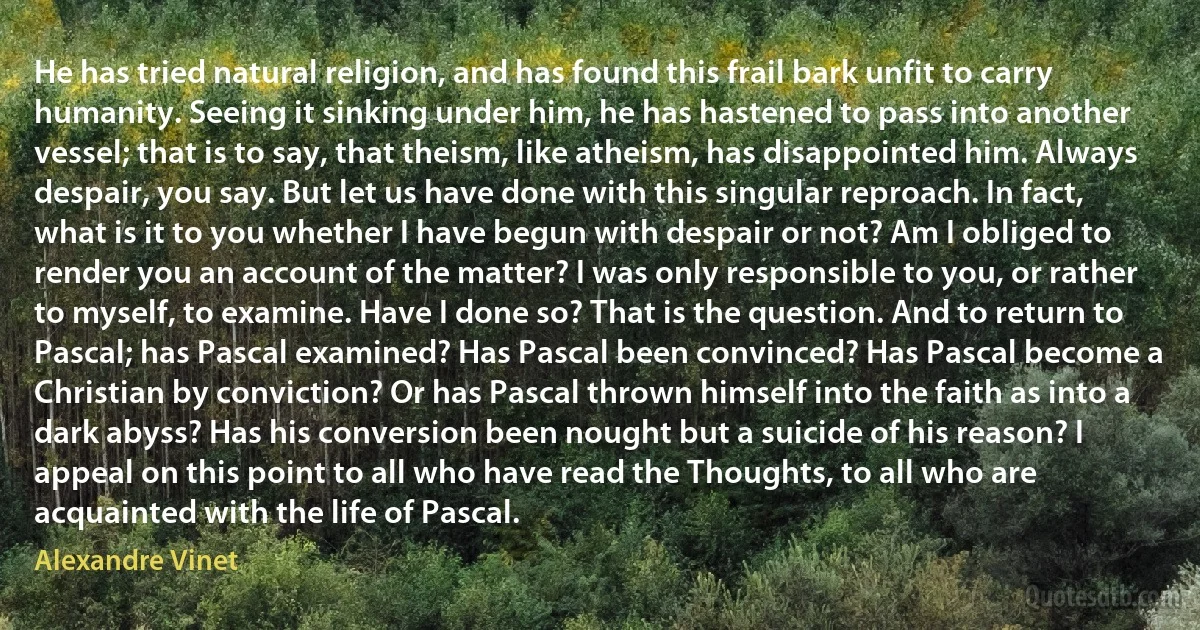
He has tried natural religion, and has found this frail bark unfit to carry humanity. Seeing it sinking under him, he has hastened to pass into another vessel; that is to say, that theism, like atheism, has disappointed him. Always despair, you say. But let us have done with this singular reproach. In fact, what is it to you whether I have begun with despair or not? Am I obliged to render you an account of the matter? I was only responsible to you, or rather to myself, to examine. Have I done so? That is the question. And to return to Pascal; has Pascal examined? Has Pascal been convinced? Has Pascal become a Christian by conviction? Or has Pascal thrown himself into the faith as into a dark abyss? Has his conversion been nought but a suicide of his reason? I appeal on this point to all who have read the Thoughts, to all who are acquainted with the life of Pascal.
Alexandre VinetRelated topics
account atheism bark begin carry christian conversion dark done faith found frail life matter natural nought pass point question read reason religion return say seeing theism throw try under vessel pascalRelated quotes
THEY who are acquainted with the present state of the theory of Symbolical Algebra, are aware, that the validity of the processes of analysis does not depend upon the interpretation of the symbols which are employed, but solely upon the laws of their combination. Every system of interpretation which does not affect the truth of the relations supposed, is equally admissible, and it is thus that the same process may, under one scheme of interpretation, represent the solution of a question on the properties of numbers, under another, that of a geometrical problem, and under a third, that of a problem of dynamics or optics. This principle is indeed of fundamental importance; and it may with safety be affirmed, that the recent advances of pure analysis have been much assisted by the influence which it has exerted in directing the current of investigation.

George Boole
Islam's money and muscle power may look impressive, certainly capable of doing some real damage to targeted countries and societies, but Islam has no chance of becoming the religion of a science-based, space-conquering world society. Exclusivist revelations have no appeal among educated people, especially after they have acquainted themselves with the Vedantic or Buddhist philosophies. That is why the Churches are investing huge resources in the battle for Asia's mind, where they face their most formidable enemy. That is why they are so active in India: not only is India's atmosphere of religious freedom more hospitable to them than the conditions of Islamic countries, or even of non-Islamic countries where proselytization is prohibited (countries as divergent as China, Myanmar, Israel, and, at least formally, Nepal); but they also know and fear the intrinsic superiority of the Indian religion.

Koenraad Elst
With the advent of medieval Scholasticism, ... we find a clear distinction between theologia and philosophia. Theology became conscious of its autonomy qua supreme science, which philosophy was emptied of its spiritual exercises, which, from now on, were relegated to Christian mysticism and ethics. Reduced to the rank of a "handmaid of theology,” philosophy's role was henceforth to furnish theology with conceptual-and hence purely theoretical-material. When, in the modern age, philosophy regained its autonomy, it still retained many features inherited from this medieval conception. In particular, it maintained its purely theoretical character, which even evolved in the direction of a more and more thorough systemization. Not until Nietzsche, Bergson, and existentialism does philosophy consciously return to being a concrete attitude, a way of life and of seeing the world.

Pierre Hadot
What! when it is necessary to take the most simple resolve, we are under the domination of our habitudes, our wants, our social relations, and a host of causes which, all of them, draw us about in a hundred different ways. These influences are so powerful, that we have no difficulty in telling, even when referring to persons whom we are scarcely acquainted with, or even know not at all, what is the resolution to which they will lead such parties. Whence, then, this certainty of foresight, exemplified by you daily, if you were not convinced, at the outset, that it is extremely probable the empire of causes will carry it over free-will. In considering the moral world a priori, you give to this free-will the most entire latitude; and when you come to practice, when you speak of what passes around you, you constantly fall into contradiction with yourselves.

Adolphe Quetelet
Much has been said of Mahomet's propagating his Religion by the sword. It is no doubt far nobler what we have to boast of the Christian Religion, that it propagated itself peaceably in the way of preaching and conviction. Yet withal, if we take this for an argument of the truth or falsehood of a religion, there is a radical mistake in it. The sword indeed: but where will you get your sword! Every new opinion, at its starting, is precisely in a minority of one. In one man's head alone, there it dwells as yet. One man alone of the whole world believes it; there is one man against all men. That he take a sword, and try to propagate with that, will do little for him. You must first get your sword! On the whole, a thing will propagate itself as it can. We do not find, of the Christian Religion either, that it always disdained the sword, when once it had got one.

Thomas Carlyle
